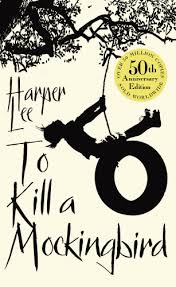To Kill a Mockingbird – Harper Lee
I am starting with To Kill a Mockingbird because it is one of my all-time favourites. It would be hard to find a bucket list of books that does not contain this modern classic, and rightly so. This novel is a powerful and important read that contains something for everyone. It is taught widely in schools and it was for GCSE that I first read To Kill a Mockingbird and have read it many times since. I think I partly love it because it is the first book I studied in great detail, when I developed a love not just of reading books, but of taking them apart and investigating their meanings. But the novel is so much more than a set text; I did not forget or get tired of it after writing essays and exams about it, rather, I grew increasingly fond of the book. It is deeply moving, challenging, and still relevant over fifty years after it was written.
To Kill a Mockingbird is narrated by the child, Scout, from the fictional town Maycomb, Alabama, in the 1950s, an insular community. Her father, Atticus, now a literary hero, defends Tom Robinson in court when he, a black man, is accused of raping a white woman. Scout’s perspective highlights the hypocrisy and injustice of the times as well as allowing Harper Lee to present the reader with some vital moral lessons.
Hence, it is a novel about racism, class and prejudice but also one about childhood, love, innocence, courage, identity, loneliness, and many more themes central to an understanding of what it means to be human. At times the novel may seem simple and sentimental but the first-person child’s perspective makes it intriguing, personal, ironic and funny at the same time.
The novel takes its title from the conversation Scout has with a kindly neighbour, Miss Maudie, when the children are given air rifles and told by their father not to shoot mockingbirds, “your father’s right […] they don’t do one thing but sing their hearts out for us. That’s why it’s a sin to kill a mockingbird”. Mockingbirds clearly signify the innocent – amongst others, Tom Robinson and Boo Radley (a mysterious and reclusive neighbour) are mockingbirds – and Scout realises this by the end of the novel when she quotes Atticus’s words back at him; it is also a novel about growing up.
The novel has been criticised for having one-dimensional characters (especially the black characters) and positioning Tom Robinson as a victim in need of Atticus’ kindness to try and save him. Amidst the 1960s struggles for civil rights, however, a simple moral message was needed and in the context of a racist society the book is surely moving in the right direction. Lee does not place everything and everyone in the novel in moral categories of black and white. Atticus himself is not perfect, for example he underestimates the danger in which the trial puts him and his children; we are asked to see the circumstances of poverty that have driven Mayella Ewell to lie and to consider Mrs Dubose a brave lady despite her rudeness. Furthermore, the ending does not bring complete resolution but ambiguity.
One of the novel’s most famous passages is when Atticus tells Scout, after her difficult first day at school, “You never really understand a person until you consider things from his point of view […] until you climb into his skin and walk around in it”. Empathy is at the heart of To Kill a Mockingbird; it teaches us not only to respect others and treat them as equals but to try to understand what they are feeling and why. It also teaches us to have the moral courage to stick to our convictions and stand up for what we believe to be right, even when loss is inevitable. This comes in the little things as Scout chooses not to hit her tormentors at school and the big things, as Atticus stands against his town in the courtroom.
It is difficult to say anything new about a novel that has been so widely read, loved and studied, but, like all good books, it can mean something individual to every reader and with every reading. To me, it is a story of finding out more about the world and the way that literature is able to eloquently express our feelings and the life lessons we learn along the way.
To Kill a Mockingbird really is one of those books everyone should read.
